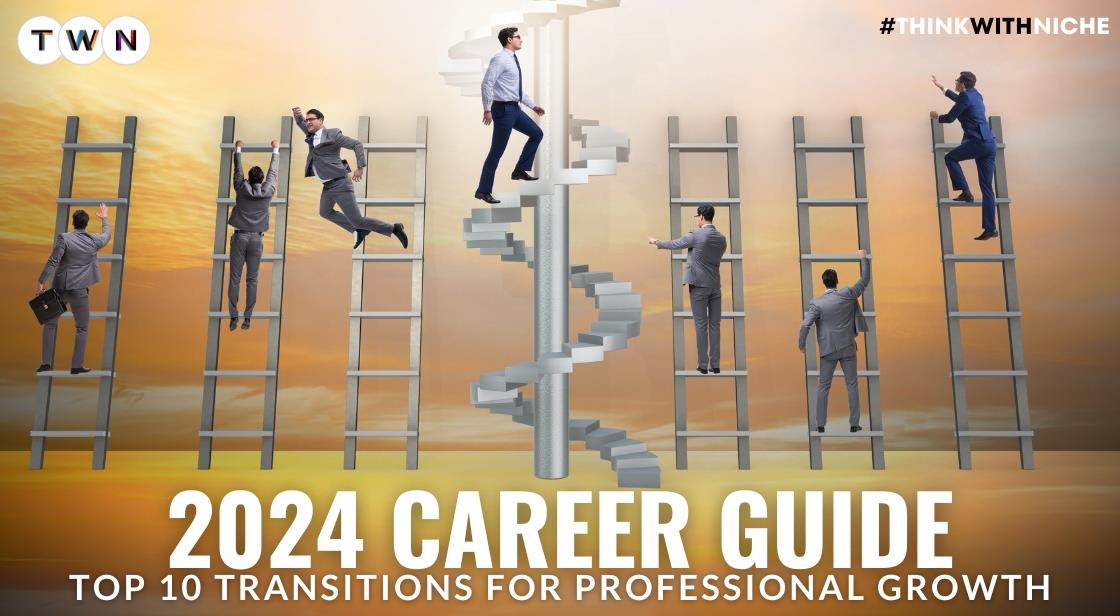Top 10 Transitions for Professional Growth: 2024 Career Guide

Blog Post
In today's rapidly evolving job market, career transitions have become increasingly common as individuals seek new opportunities, growth, and fulfillment. With advancements in technology and changes in industries, the landscape of professions is continuously shifting, prompting many to consider different career paths.
This shift might be driven by a desire for increased purpose, better work-life balance, or the need to adapt to new technologies. This guide offers a comprehensive roadmap to help you navigate a successful career change in 2024.
Understanding the process of transitioning careers is crucial for success in this dynamic environment. As of 2024, statistics indicate a growing trend in career changes, with a significant percentage of professionals contemplating or actively pursuing shifts in their occupations.
This trend is driven by various factors, including the desire for personal development, dissatisfaction with current roles, and the pursuit of passions and interests.
Recognizing the need for a structured approach to career transitions, this guide outlines ten types of career transitions and provides actionable steps to navigate them effectively.
From assessing strengths and weaknesses to exploring new possibilities and acquiring necessary skills, individuals are equipped with a comprehensive framework to make informed decisions about their career trajectories.
Moreover, the importance of networking, mentorship, and continuous learning is emphasized as essential components of a successful career transition strategy.
By leveraging the latest insights and data, individuals can embark on their journey towards a fulfilling and rewarding career path with confidence and clarity in the year 2024 and beyond.
Top 10 Career Transitions for 2024: Skills, Demand & Actionable Steps
1. Make a list of your advantages
We concentrate on our faults far too frequently. Speaking about our skills really causes a lot of us to feel a little awkward. You do not need to discuss them at this time, but you do need to identify and evaluate them
By thinking about your abilities, you may discover what you're good at, what you prefer to do, and what areas you can contribute to the team. You may then use this to determine the positions and situations which you are most likely to succeed.
Consider these inquiries for yourself:
What kind of compliments do you generally receive?
What opinions have your friends, family, supervisors, and coworkers have about you? What are others saying you're good at?
Which professional or personal accomplishments are you most proud of?
What are some of your proudest achievements to date, and what abilities, characteristics, and attributes made it possible for you to succeed?
Which times do you work best and worst?
Which chores and projects do you often finish on time, effectively, and to a high standard?
Which assignments and undertakings usually make you feel like you've reached a brick wall, are impatient, or are you often checking the clock?
What are the advantages and disadvantages involved here?
Write down every quality and strength you can think of as you respond to these questions. This will provide you with a useful list to use later on while assessing possible career pathways.
2. Determine what needs to be improved
It takes more than simply identifying a profession that corresponds to your existing abilities to choose a career path. Actually, that's a really restrictive course of action. Additionally, you have to recognize and take advantage of your capacity to grow into new strengths.
This stage is all about thinking about the new abilities you want to learn and possible places where you may improve.
Think about the following:
If you had the time and means, are there any particular challenging talents you've always wanted to develop?
For example, even though I'm a writer, I've always believed that learning how to code would be amazing. Although I don't intend to become a web developer, this may indicate that I'd like to improve my problem-solving abilities.
Which instances or circumstances come to mind when you wish you had acted differently or better?
For instance, did you just have an argument with someone and wish you had explained things more clearly beforehand? If you had been better organized at college, might you have made your own life easier?
Do you think having data analysis skills is really valuable? yet find the truth a little scary?
Think about the hard or soft skills you may learn from each example you can think of as a result of your contemplation.
What are some ways to develop your current skills?
Taking a look at your first list of strengths, is there anything you might improve upon? What are some ways to develop and apply your core strengths?
Consider your strengths like muscles that require frequent exercise. Identify opportunities for improvement by coming up with fresh, original methods to utilize your talents.
3. Assess the first part of your career
It is helpful to draw lessons from the past while making plans for the future. Examine your professional history and consider the components you would be happy to leave behind, as well as the things you have found most enjoyable. If you don't have any experience from a prior job, concentrate on your education or your overall well-being.
You can use the following questions to guide you, or you can just make a list of things you "like" and "dislike":
1. This is how I would characterize the perfect workday:
2. My ideal workspace is
3. The three aspects of my current/past employment that I appreciate the most are/were...
4. I'm most content at work.
5. This is how I would characterize a miserable workday
6. I find it difficult to work in a setting that is.
7. The three aspects of my current/past employment that I appreciate the least are/were.
8. I am irritated at work when.
Feel free to write anything that comes to mind as you go along. The goal is to actively consider your preferences for and dislikes in relation to your job and place of employment; there is no right or incorrect response or structure here.
You could be surprised by what uncovers itself! Naturally, knowing all of this is helpful when deciding on your next professional step.
Also Read: Discover 10 High-Paying, Low-Stress Jobs for 2024
4. Determine your motivators and rank them.
It's time to consider your motivations next. Put differently, what outcomes do you want to achieve from your career?
Please review these possible sources of motivation and feel free to provide more. Subsequently, decide which three are most crucial for your profession (or, if you can't decide between only three, rank them all from most to least important):
1. Being unique
2. The chance to assist others
3. To participate in a noble cause
4. Monetary compensation
5. Balance between work and life
6. Working in a group or alone Working alone or independently
7. The flexibility to be flexible and determine your own hours
8. Independence and autonomy when it comes to jobs and initiatives
9. The chance to serve as a mentor to others
10. The chance to pick up knowledge from other people
11. Working in a digital or tech-driven environment
12. Operating in a practical or physical role
Remember that as your career progresses, your priorities may too. Your current list of priorities is not final! You may decide to put financial stability first when making your next job move, but that doesn't mean you have to give up creativity forever. You might choose to prioritize it later.
You can evaluate potential job options to determine how they align with your priorities.
5. Examine your possibilities for a profession
Thus far, you have given much consideration to your professional strengths, areas that want improvement, likes, dislikes, and motivators. It's time to investigate alternative job routes now.
There are several job titles that may not even be familiar to you, numbering in the hundreds or even thousands. So how can you make it more specific? The following advice is provided:
List three to five broad fields of study or industries in which you could be interested. Any topic you can think of that you'd like to learn more about is fair game, including psychology, wellness, cuisine, technology, design, the environment, coaching, and self-improvement.
Examine careers and sectors with rapid development. Hiring for high-growth positions is the best option if you want to create a career that will probably last into the future. For instance, look up the fastest-growing vocations according to the U.S. Bureau of Labor Statistics. As an alternative, look for the most sought-after professions and competencies on Google to discover which positions surface most regularly in 2024.
It is then possible to begin narrowing down your study to certain fields or even job titles. For instance, if you're interested in tech-related design, you may look into fields like user interface (UI) and user experience (UX) design.
Whatever field or professional route you're interested in, concentrate your studies on:
What the function involves: What are the normal duties and obligations of an individual employed in the field? To gain a sense of what's involved, look at current job advertisements and look for "day in the life" stories.
Qualifications to enter the field: Are there any prerequisites set by the industry that you must meet?
Other opinions about the role: If at all possible, talk to those who are now employed in the sector to get a sense of what it's like and involves.
Always keep your requirements, motivators, strengths, and opportunities for improvement in mind while you consider your options for a profession.
Which possible professional path corresponds with which one?
Does it resonate with your interests and ambitions and get you excited?
Continue studying until you are able to affirm it.
6. Acquire the new abilities you'll need and think about getting certified
You may begin taking proactive measures to achieve your next professional goal as soon as you've determined what it is.
You'll need to become proficient in a few industry- and job-specific abilities regardless of the professional path you've selected. This entails being familiar with industry lingo, picking up on any underlying concepts and procedures, and acquiring the instruments of the trade.
You can begin by studying on your own, doing things like:
1. Studying up on the subject through books and blogs
2. Taking in podcasts related to the industry
3. When feasible, try out tools and applications.
4. 0bserving YouTube lessons (especially if you're going into a practical field like web development or design)
But the best course of action when switching to a whole new profession is to take an organized learning path. This might be an online course or bootcamp, a typical college or university degree, or a vocational training program, depending on the field you're going into.
7. Selecting the appropriate degree or program for a career shift
There are a few things to take into account while selecting a course or certification:
Is there a certain degree or certification needed for your new professional path? A variety of courses and credentials are required for entry into certain occupations. Others will only accept a certain certification; these would include psychology programs approved by the American Psychological Association. Before spending time and money on a course, do some research.
How much time are you able to dedicate to picking up new skills? You should think about a flexible course or certificate if you wish to shift careers while working and gaining new skills. Something more extensive might be something you consider if you are ready and able to commit full-time. Consider your schedule before committing.
Which means of financing your training? The cost of a course or certificate may vary depending on where you reside. Make a strategy for how you will pay for your education in advance and look into your possibilities for loans, grants, income-share agreements, scholarships, and payment plans.
Your selected course should provide you with an industry-recognized, systematic method to gaining the skills you'll need to succeed in your new area once you've worked out the practicalities.
8. Emphasize and utilize your transferable abilities
Whenever we consider changing careers, we frequently place a lot of emphasis on the knowledge and expertise we now lack. The best job changers, though, also pay attention to what they currently have to offer and how to use those abilities in their new, apparently unrelated field.
Spend some time thinking back on what you have previously done as you acquire new talents for your new profession. In what ways could your past or present positions prepare you for your next career? If you're a teacher who wants to go into marketing, for instance, you probably already know how crucial it is to target your material at particular audiences.
If you work in customer service and decide to pursue a career in user experience, you are already an expert in prioritizing the needs of the user. You've undoubtedly already dealt with some basic analytics tools and approaches if you're a marketer retraining as a data analyst.
This is a crucial stage since it will help you show the value you can contribute to your new career and help you comprehend it. Although it may seem as though you're starting from nothing, you really carry a wealth of transferable talents with you.
In order to make a compelling case for yourself during interviews and in your resume, cover letter, personal website or portfolio, LinkedIn page, and other online materials, emphasize these abilities!
9. Collaborate with an advisor
Although it's easier said than done, there are several advantages to finding a mentor. Anyone may benefit from mentoring at any stage of their career, but those changing careers or entering uncharted territory find it extremely beneficial.
In summary, we've written here about the value of having a mentor and how to utilize yours.
1. A mentor may offer general career guidance as well as firsthand knowledge of your new industry.
2. They can offer you feedback on your work, especially if you intend to pursue a career where a portfolio is necessary.
3. Your network can be expanded and you may receive recommendations for jobs from a mentor.
In any other case, you'll have to be more proactive. Make connections with individuals in your new industry on LinkedIn if you're currently active there. Ask them if they would be open to a quick phone conversation or just a quick email exchange.
Make sure to identify yourself and let them know exactly why you are texting them. Tell them exactly what you need help with. Are there any particular queries you'd want to ask or suggestions you'd like to receive?
Networking is another (perhaps more natural) method of finding a mentor. Make contacts by participating in in-person or virtual industry gatherings. This resource has further information about finding a mentor.
10. Expand your contact base
You must fully immerse yourself in your new industry in order to forge a new career. Networking may lead to career chances in addition to being a fantastic method to learn about the industry and make contacts.
Develop your network early on by:
1. Going to gatherings and activities
2. Making LinkedIn connections with industry professionals
3. Establishing a connection with your fellow students in a program or course
4. Try speed networking for your career—it's like speed dating!
Make an effort to establish connections with a range of individuals, including recruiters, content producers, and novices such as yourself, in addition to seasoned industry specialists. You'll learn more about your new industry the more diversified your network is.
Although we've arranged these stages in a certain order, it's okay if your approach isn't nearly as straightforward! Work your way up to the stages that need more thinking and effort by starting with the ones that are the most doable for you. Best of luck to you!
You May Like
EDITOR’S CHOICE












